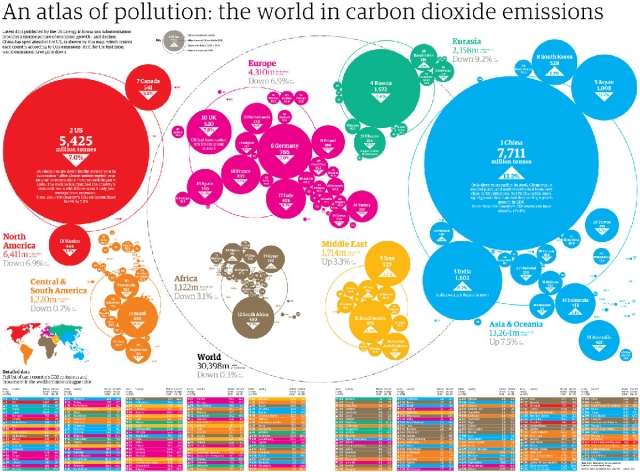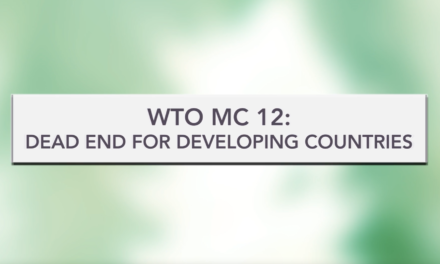By Sabrina Gacad*
The Climate Change Commission of the Philippines says China should be included in a list of countries that must commit to mandatory cuts in greenhouse gas (GHG) emissions.
The Commission’s position was stated by Rep. Narciso Bravo of the First District of Masbate during the plenary deliberations on the 2013 national budget on Sept. 17. Queried on the issue by Rep. Walden Bello of Akbayan, Bravo said, requiring mandatory cuts from China was “the position of the Philippines. The problem is we cannot compel them, we cannot convince them to take positive action.” Bravo, who was sponsoring the Climate Change Commission’s budget, went on to say, “the Philippines is a member of the minority block in the G77 that has come to a resolution relative to concerns about China. This group of countries maintains that we have to act on this particular problem as soon as possible.”
China’s GHG Record
China, said Bello, is now the world’s biggest emitter of carbon dioxide. In 2011 China accounted for 29% of global carbon emissions, and registered a 9% increase in carbon emission from the previous year. Its per capita emission is at 7.2 tons/per person, which is already within the 6 to 19 tons per person/per capita range of Annex 1 (developed) countries. Bello added that India, which is also a member of G77, was the 4th largest carbon emitter in 2011, accounting for 6% of total emissions. Big emitters like China, India, South Africa, and Brazil, he added, are “hiding behind the skirts of the G 77,” claiming that they are developing countries in order to avoid being subjected to mandatory cuts.
The United Nations-sponsored global climate negotiations are at a stalemate, with the United States and China, the two biggest emitters of greenhouse gases refusing to commit to mandatory cuts. The US position is that it will only agree to mandatory cuts if China and other so-called big emerging economies like India, Brazil, and South Africa, which are on a steep upward trend as GHG emitters, also agree to mandatory cuts. China, on the other hand, refuses to agree to cuts unless the US and other Annex One or developed countries agree to make new commitments to make mandatory cuts under the Kyoto Protocol.
Many observers of the negotiations have claimed that while seemingly in opposition, China and the US actually benefit from the stalemate in the negotiations since it allows them to postpone reforming their GHG-intensive production and consumption regimes.
Emergency on the Climate Front
According to a tenuous accord reached at the UN climate meeting held in Durban, South Africa, in December 2011, all countries must make proposals for cuts by 2015 and implement their proposals by 2020. With eight years of inaction till 2020, climate specialists feel that global mean temperature will rise to 4-6 degrees Celsius in this century, instead of being limited to 2 degrees that most see as the outer limit beyond which there would be unpredictable and likely very calamitous consequences.
“We have an emergency on the climate front,” said Bello. “The Annex 1 countries must make deep cuts, 40-50 per cent from 1990 levels. But big emitters like China should also agree to cuts, though this should probably proportionally less than the Annex 1 countries, in accordance with the accepted principles of historical responsibility and common but differentiated responsibility.”
Empty Fund
Questioned about the Global Climate Fund (GCF), Bravo admitted that so far no funds have been committed by the Annex I countries that are expected to be the main donors owing to their being responsible for most of the accumulated GHG emissions in the atmosphere. GCF funds are meant to assist developing countries that are expected to take the brunt of the disastrous effects of climate change.
Asked if the Climate Change Commission was coordinating its work with the Department of Energy, Bravo answered in the affirmative. Bello received the answer with skepticism raised since, in his view, the DOE was following a path of greater dependence for power generation on coal-fired plants, which are the worst from the point of view of their contribution to GHG emissions. “I think the Commission and the DOE are on different paths,” he said.
Congressional Hearings on Climate Negotiations
Bello informed the Commission that he intended to file a resolution calling for hearings in the House on the process of developing the Philippines’ negotiating positions in the climate discussions. “The purpose of the hearings,” the representative from Akbayan stated, “is to promote transparency, allow Congress to make an input, and ensure that our negotiating position truly serves the national interest of the Philippines and that of other countries at risk and not that of big emitters.”
Bello filed House Resolution 2786 the day after the budget hearing, with Rep. Mel Sarmiento and Rep. Danilo Fernandez, chairman of the Committee on Ecology, as co-authors. The climate hearings are likely to be held, Bello said, before the next climate change negotiations that will take place in Doha, Qatar, at the end of 2012.
*Sabrina Gacad is a legislative aide at the office of Rep. Walden Bello, representative of the party Akbayan in the House of Representatives of the Philippines.










